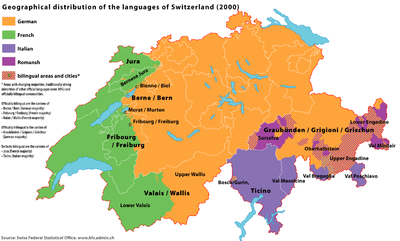Swiss French


Swiss French (French: suisse romand) is the variety of French spoken in the Francophone area of Switzerland known as Romandie. It is distinct from Franco-Provençal (Arpitan), the closely related Romance language originally spoken in Romandie, and includes variants such as Frainc-Comtou. According to 2012 census figures, roughly 1.8 million Swiss spoke French as their primary language (22.6% of the total population), making it the second most widely used language in the country after German.[1]
Swiss French differs very little from standard Parisian French and Belgian French. These differences are minor and mostly lexical: a Swiss French speaker would have no trouble understanding a French speaker, while a French speaker would encounter only a few unfamiliar words while listening to a Swiss French speaker. Swiss French differs from the French of France to a far lesser extent than Swiss German differs from standard German. This was not always the case, as most of the dialects spoken in the Romandie died out and thus are no longer spoken or used.
There is not a single standardized Swiss French language: different cantons (or even different towns in some cases) will use different vocabulary, often derived from the local regional language or from German, since Switzerland is predominantly German-speaking.
Many Standard French terms are used in certain cantons such as Geneva due to their proximity to the French border.
Differences between Swiss French and standard French
Many differences between Swiss French and French are due to the different administrative and political systems between Switzerland and France. Some of its distinctive lexical features are shared with Belgian French (and some also with Quebec French), such as:
- The use of the word septante for seventy and nonante for ninety as opposed to soixante-dix (literally 'sixty-ten') and quatre-vingt-dix (literally 'four twenties-ten') of the "vigesimal" French counting system.
- The use of the word déjeuner for "breakfast" ("lunch" in France, which uses petit déjeuner for "breakfast"), and of the words le dîner and le souper for "lunch" and "dinner" respectively (in French of France, déjeuner and dîner respectively), much like the varying uses of dinner and supper throughout the English-speaking world.
Other examples which are not shared with Belgian French:
- The word huitante is sometimes used for eighty instead of quatre-vingts (literally 'four twenties'), especially in the cantons of Vaud, Valais and Fribourg; the term octante (from the Latin octaginta) is now considered defunct.
- The word canton has a different meaning in each country.
- In France, a post office box is called a boite postale (BP), whereas in Switzerland, it is called a case postale (CP).
Examples of words that differ between Swiss French and Standard French
| Swiss French | Standard French | Translation |
|---|---|---|
| action | promotion | special offer |
| assurance ménage | assurance responsabilité civile | civil liability insurance |
| attique | dernier étage | top floor |
| bancomat | guichet automatique bancaire | ATM |
| biffer | rayer/barrer quelque chose d'écrit | to scratch/delete |
| bobet | bête or stupide | stupid |
| boguet | mobylette | moped |
| bonnard | sympa or bien | nice |
| bonne-main | pourboire | tip (gratuity) |
| borne hydrante | bouche d'incendie | fire hydrant |
| bourbine | suisse-allemand | Swiss-German |
| carnotzet | cave à vin/cellier/fumoir | Wine cellar; however these expression can seldomly be found in French places close to Switzerland. |
| chenis | désordre | mess |
| chiquelette | chewing-gum | chewing-gum |
| gymnase (Vaud) or collège (Genève) | lycée | high-school |
| cornet | sac en plastique | plastic bag |
| cycle | collège | middle-school |
| déjeuner | petit-déjeuner | breakfast |
| dent de lion | pissenlit | dandelion |
| dîner | déjeuner | lunch |
| s'encoubler | se prendre les pieds dans quelque chose/trébucher | to trip over |
| s'énuquer | se briser la nuque | to break one's neck |
| étude d'avocats | cabinet d'avocats | law firm |
| faire la noce | faire la fête | to party; however these expression can also be found in Standard French eventhough it is probably less used or used predominantly by old people |
| fœhn | sèche-cheveux | hairdryer |
| frouz | les Français | people from France - French |
| un fonds | un terrain or un champs | a field |
| fourre | dossier | folder |
| galetas | grenier | attic |
| giratoire | rond-point | roundabout |
| gouille | flaque | puddle |
| huitante | quatre-vingts | eighty |
| linge | serviette | towel |
| maman de jour | assistante maternelle | day care assistant |
| maturité | baccalauréat | high-school final examination |
| natel | (téléphone) portable | mobile phone |
| mutr | mère | mother |
| nom de bleu! | nom de dieu! | in the name of god!/god dammit! |
| nonante | quatre-vingts-dix | ninety |
| panosse | serpillière | floorcloth |
| pive | pomme de pin | conifer cone |
| poutzer | nettoyer | to clean |
| Procès verbal d'examen (PV) | bulletin de note | report card |
| régie | agence immobilière | real estate agent |
| royer | pleuvoir | to rain |
| septante | soixante-dix | seventy |
| services | couverts | cutlery |
| signofile/indicateur | clignotant | turn signal |
| souper | dîner | dinner |
| tablard | étagère | shelf |
| talus | pente | slope |
| uni (short word for université) | fac (short word for faculté) | university |
| votations | scrutin | voting |
| vatr | père | father |
See also
- Swiss German
- Swiss Italian
- Linguistic geography of Switzerland
References
| ||||||||||||||||||||||||||||||||